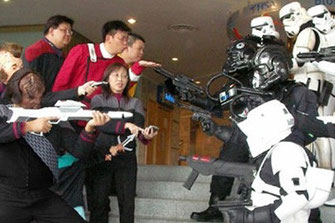Creating Worlds
If we want to say that Sherlock Holmes lives at 221B Baker Street and not 221C, it is helpful to have something that is Sherlock Holmes that we can talk about. But obviously Sherlock Holmes is not the same sort of thing we are. For this reason, Meinong introduced a distinction between Grade A and Grade B existence. Some people find this spooky. Where do the Grade B things come from? How can they subsist--yet not exist--in some other realm?
Saul Kripke has a nifty solution to this issue. (Nifty doesn't mean right, of course.) He thinks there is something that is Sherlock Holmes, and all other fictional characters. They exist, full-on, Grade A. But they aren't flesh-and-blood things. They are abstract objects. Moreover, we know where they come from: they are created by human activity. When Conan Doyle wrote the Sherlock Holmes stories, we say he created Sherlock Holmes. According to Kripke, that is exactly the right way to talk about it. Humans have the ability to bring abstract objects into existence by our creative activity.
But abstract objects sound pretty spooky, don't they? Isn't 'abstract object' a contradiction in terms?
Well, some philosophers think so. Nominalists say that the only things that exist are particular, concrete objects--what we usually mean when we say "object."
But others think there are things that are not concrete. They are real, but there is no place where they are. To give you more of an idea of what this means, it will help to talk about one of the greatest fictional characters of all time.

He's great because he thinks he's evil, but he's wrong about evil.
The Count here is holding a numeral one--there are lots of those scattered about the world--and he is holding one thing, but we wouldn't say that he is actually holding the number one. That isn't the kind of thing that can be held.
Yet we say this episode is brought to you by the number one. How could it be a sponsor if it didn't exist? And there are many more ways we talk that seem to assume there are numbers. For example, we say 'there's a number greater than 100'. This is why those opposed to nominalism--who, quite unhelpfully, are called realists--think that numbers, while abstract, exist.
Those who think that numbers are abstract objects disagree about whether they are created by humans. Kripke thinks fictional characters are abstract objects created by humans. This raises questions of how much is required to create these abstract objects. If I write Harry Potter fan-fiction, does that mean I have created new versions of the characters? What if I misread the story aloud to my kids and say Hermione has blond hair?
Copyright 2019 by Sam Ruhmkorff

